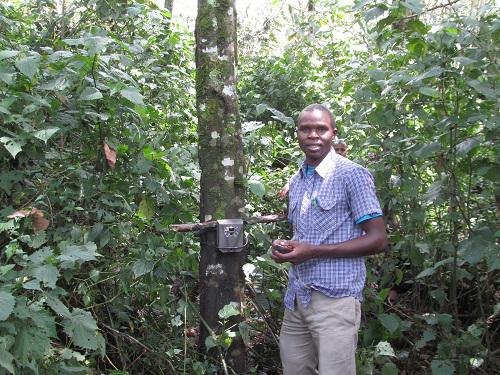Aaron Onserio
This project will investigate small carnivore diets and human-carnivore conflicts across pristine and human-modified habitats at Mau Forest Complex, Kenya. Community surveys and ecological studies will help unravel the true impacts of small carnivores on rural communities. Aside from raising awareness to debunk myths about these species among local communities, this project will help in understanding their requirements for survival and ecological roles in this imperilled forest as leverage for mitigating conflicts and enhancing their conservation. The project will incorporate the aspect of sensitizing the communities as part of public education and community outreach programme on the needs to conserve the forest. As part of this endeavour, the project will work with local communities to establish tree nurseries in selected areas where we will undertake our mesocarnivores project to establish an afforestation programme especially in the areas that have been denuded of forests.

Setting cameras at Transmara Mau Forest. ©Adam Ferguson
Although little is known about the ecology of African small carnivores (< 15 kg), many species are threatened by habitat loss and human persecution. The rate at which small carnivores, hereafter referred to as mesocarnivores, are declining is high especially in non-protected areas due to habitat loss, driven by unprecedented human population growth. Mau Forest is one of the natural areas that is under threat because of human encroachment, deforestation and fragmentation. This may result in loss of habitat and prey or diet, thus extirpation of this important but misunderstood component of the ecosystem. All these observations have prompted me to develop a project assessing the conservation, ecology and community conflict in relation with mesocarnivores, with an educational outreach focused on conserving the mesocarnivores and the forest at large.
This project will investigate small carnivore diets and human-carnivore conflicts across pristine and human-modified habitats at Mau Forest Complex, Kenya. Community assessments and ecological studies will help unravel the true impacts of small carnivores on rural communities. Aside from raising awareness to debunk myths about these species among local communities, this project will help in understanding their requirements for survival and ecological roles in this imperilled forest as leverage for mitigating conflicts and enhancing their conservation. The project will incorporate the aspect of sensitizing the communities as part of public education and community outreach programme on the needs to conserve the forest. As part of this endeavour, the project will work with local communities to establish tree nurseries in selected areas where we will undertake our mesocarnivores project to establish an afforestation programme especially in the areas that have been denuded of forests.
This project will combine community engagement and active research to understand potential conflicts and/or benefits of mesocarnivores to people living on the edges of Mau Forest. Community cognizance will be established in surrounding primary schools and through community gathering. This information will be used to raise awareness and/or positive perception of these understudied and often misunderstood species. This investigation will add more impact on other organizational efforts towards conserving the Mau Forest from extinction, e.g., African Wildlife Foundation.
The entire project is estimated to take 12 months with the first 6 months set for fieldwork. This will include; pre-experience survey, to estimate the impact of the project on local communities’ perceptions of mesocarnivores, live trapping and camera trapping, laboratory work and setting up of tree nurseries.